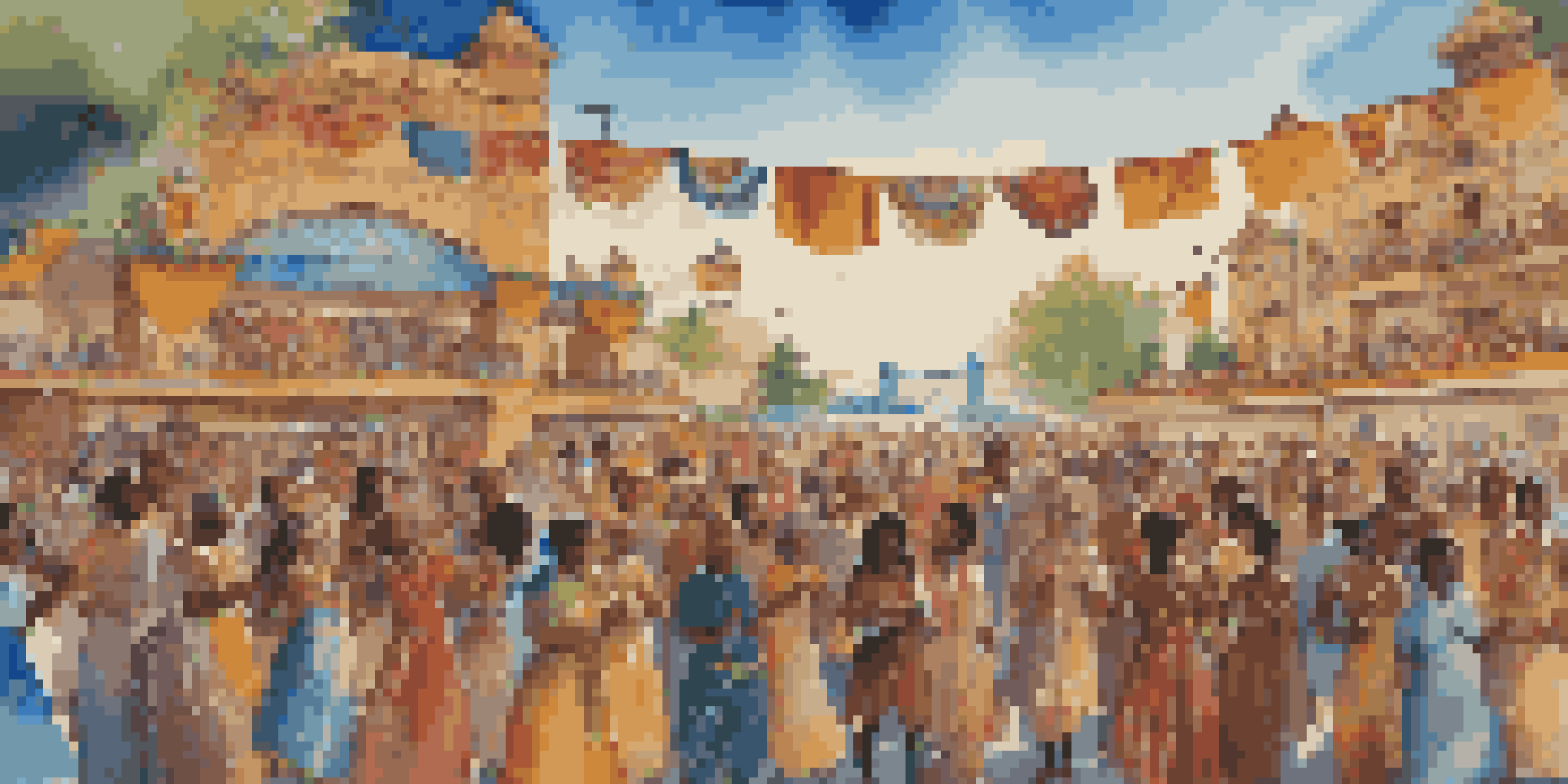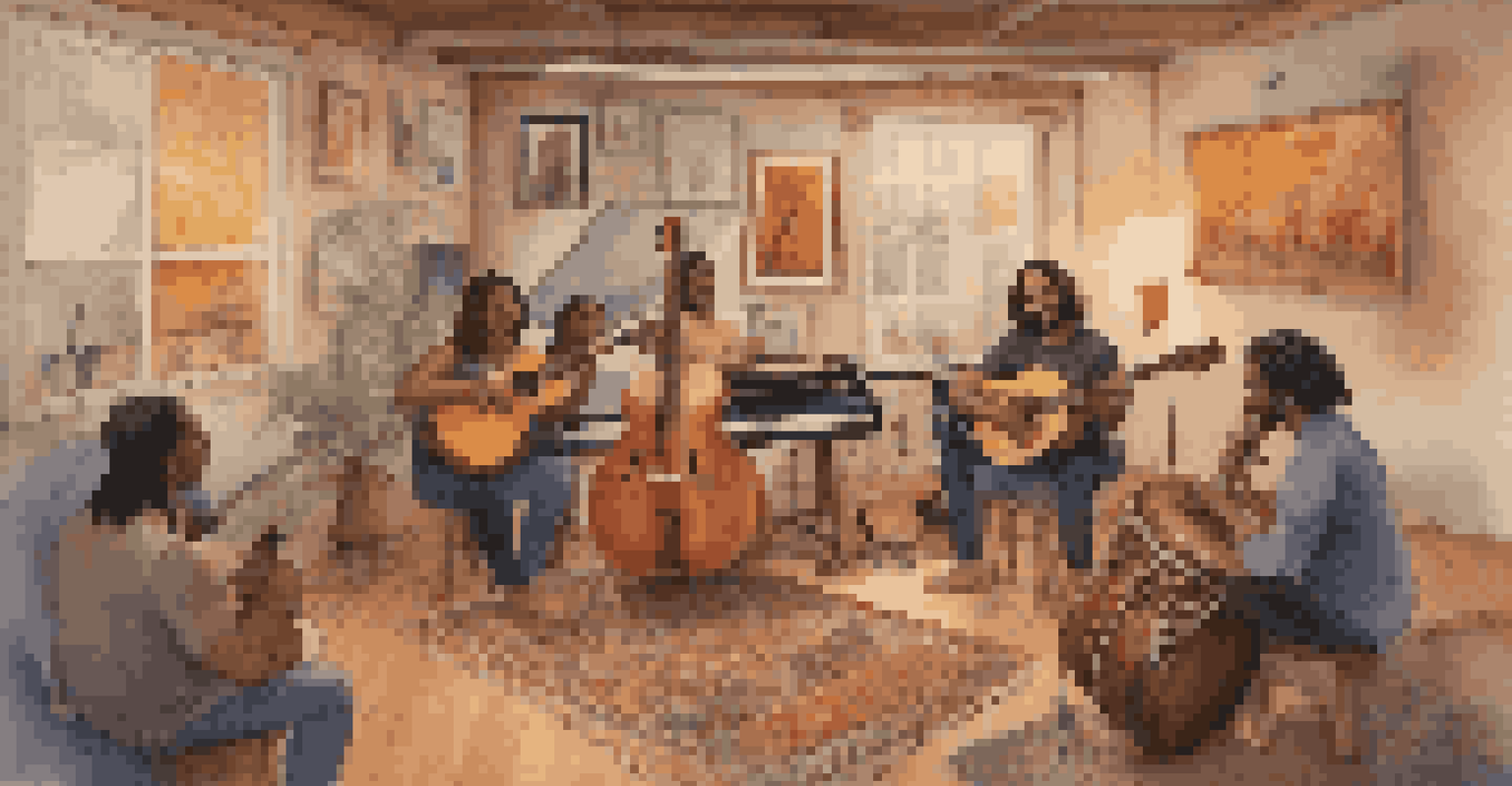Cultural Appropriation in Music: A Deep Dive into Controversies

Understanding Cultural Appropriation in Music
Cultural appropriation in music refers to the adoption of elements from one culture by members of another, often without permission. This phenomenon can be seen when artists borrow musical styles, instruments, or fashion from cultures that are not their own. While borrowing can foster creativity and collaboration, it sometimes leads to significant controversy, particularly when the original culture is marginalized.
Cultural appropriation is the act of taking or using elements from a culture that is not your own, often without understanding or respecting its significance.
For example, a white artist incorporating African rhythms or Native American motifs into their music may spark debates about authenticity and respect. Critics argue that this practice can commodify and dilute the original cultural significance. Such discussions are essential as they shed light on the power dynamics inherent in cultural exchanges.
Navigating this landscape requires sensitivity and understanding, as music has always been a melting pot of influences. However, the line between appreciation and appropriation can be blurry, making it crucial to engage in open dialogue about these issues.
Historical Perspectives on Cultural Borrowing
To better understand cultural appropriation, it's helpful to look at its historical context. Throughout history, music has served as a means of cultural exchange, with genres evolving through the blending of various influences. From jazz to rock and roll, many musical styles are the result of cross-cultural pollination, which can complicate the discussions around appropriation.

However, the historical backdrop also reveals instances where dominant cultures have exploited marginalized ones. For instance, many Black artists laid the groundwork for rock music, only to have their contributions overshadowed by white musicians who gained commercial success. This pattern raises important questions about recognition, credit, and the ethical implications of borrowing.
Cultural Appropriation vs. Appreciation
Understanding the distinction between cultural appropriation and appreciation is vital for fostering respect in the music community.
Understanding this history provides a nuanced perspective that can inform current debates. It encourages us to reflect on who gets to tell a story and whose voices remain unheard in the music industry.
The Role of Social Media in Amplifying Controversies
Social media has transformed the landscape of music and cultural appropriation, providing a platform for discussions that were once confined to niche audiences. Artists and fans alike can voice their opinions, share experiences, and call out instances of appropriation in real time. This democratization of discourse can lead to increased awareness and accountability.
Art is a reflection of culture, and in order to create authentically, we must recognize the roots of our influences.
For example, when a popular artist is accused of cultural appropriation, social media allows for immediate backlash, mobilizing supporters and critics alike. Hashtags can spread awareness and educate others about the implications of such actions, fostering a more informed public. This rapid exchange of ideas can force artists to reconsider their choices and the potential harm they may cause.
However, while social media can be a powerful tool for advocacy, it can also lead to cancel culture, where artists face severe backlash without room for dialogue. This complexity highlights the need for a balanced approach when discussing cultural appropriation.
Case Studies: Controversial Music Moments
Several high-profile controversies have highlighted the delicate nature of cultural appropriation in music. One notable case is the backlash against Miley Cyrus during her transition from country to pop, where her performance style and imagery were criticized for appropriating Black culture. This incident sparked discussions about authenticity, exploitation, and the responsibility of artists.
Similarly, the appropriation of reggaeton by mainstream pop artists has raised eyebrows, especially regarding the credit given to original creators. When white artists dominate a genre traditionally rooted in Latino culture, it can lead to feelings of erasure among the original artists and their communities. These cases exemplify how cultural appropriation can manifest in various ways within the music industry.
Impact of Social Media on Discourse
Social media amplifies discussions around cultural appropriation, enabling real-time reactions and increasing awareness, but can also lead to cancel culture.
Examining these moments allows us to dissect the broader implications of cultural borrowing and its effects on the communities involved. They serve as reminders of the importance of recognizing and celebrating the origins of musical inspiration.
The Fine Line Between Appreciation and Appropriation
Differentiating between cultural appreciation and appropriation can be challenging, but it is essential for fostering respect within the music community. Appreciation involves a genuine understanding and respect for another culture, often accompanied by collaboration and acknowledgment of its origins. In contrast, appropriation tends to disregard the significance of the original culture and often benefits the appropriating artist at the expense of the marginalized group.
For instance, when artists collaborate with cultural representatives and ensure that the original creators are credited and compensated, it reflects appreciation rather than appropriation. This approach not only honors the original culture but also enriches the music by infusing it with authentic elements.
Navigating this fine line requires artists to engage in critical self-reflection and seek guidance from the communities they wish to draw inspiration from. By fostering genuine connections, artists can create music that celebrates diversity while avoiding the pitfalls of appropriation.
The Impact of Cultural Appropriation on Artists
Cultural appropriation can have profound effects on artists, both for those who appropriate and those whose cultures are appropriated. For artists from marginalized backgrounds, seeing their culture commodified can lead to feelings of anger and frustration, especially when they struggle to gain visibility and success. This dynamic underscores the importance of equity and representation in the music industry.
On the flip side, artists who engage in appropriation may face backlash that can impact their careers. While some may thrive on controversy, others may find that public opinion can turn swiftly against them, leading to loss of fan support or even financial repercussions. This reality serves as a cautionary tale for artists navigating their creative paths.
Historical Context Matters
Recognizing the historical dynamics of cultural borrowing helps illuminate the complexities of appropriation and respect within the music industry.
Understanding the consequences of cultural appropriation helps underline the importance of ethical considerations in music. Artists have the power to shape narratives and influence culture, making it crucial to approach their craft with mindfulness and respect.
Moving Forward: Fostering Cultural Respect in Music
As we continue to navigate the complexities of cultural appropriation in music, fostering respect and understanding is essential. This can be achieved through education, open dialogue, and collaboration between artists of different backgrounds. By creating spaces for cultural exchange that prioritize respect and acknowledgment, the music industry can thrive in a way that celebrates diversity.
For example, initiatives that highlight and support underrepresented artists can help bridge gaps and promote collaboration. Festivals, workshops, and mentorship programs can provide opportunities for artists to learn from one another while appreciating the cultural significance behind various musical styles.

Ultimately, the goal is to cultivate an environment where cultural exchange enriches music rather than exploits it. By prioritizing mutual respect, artists can create a more inclusive and vibrant musical landscape that honors the diverse tapestry of human experience.